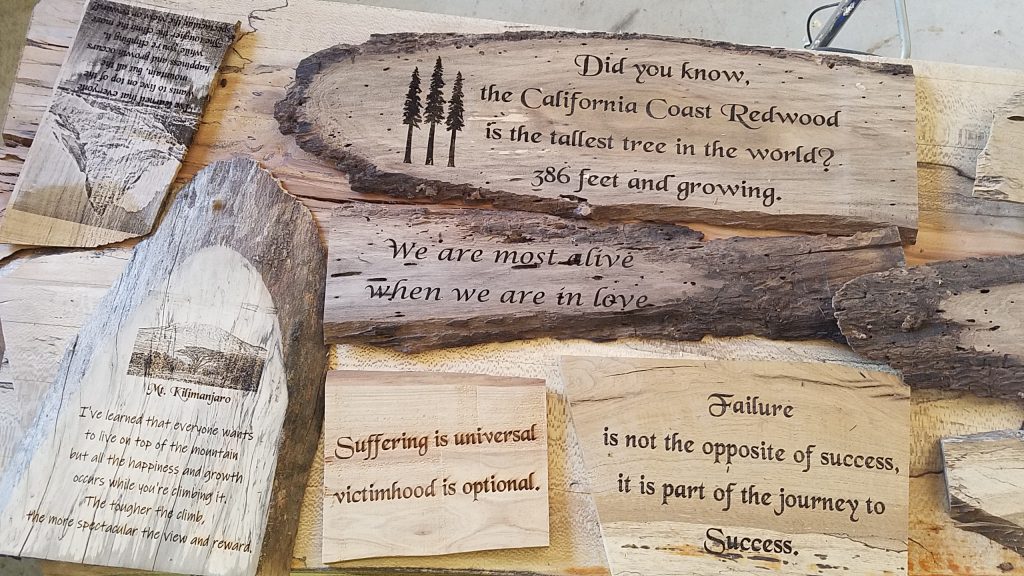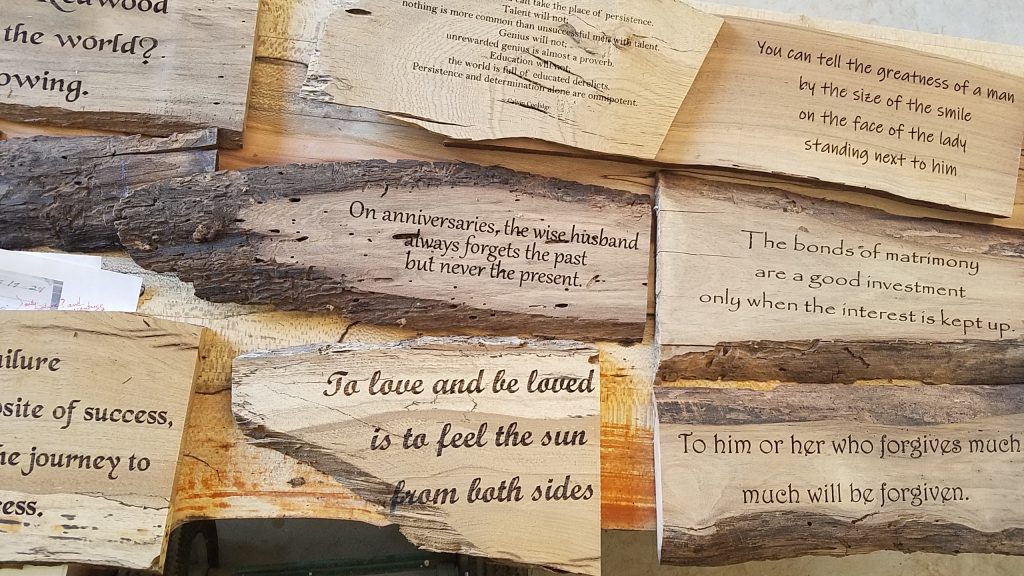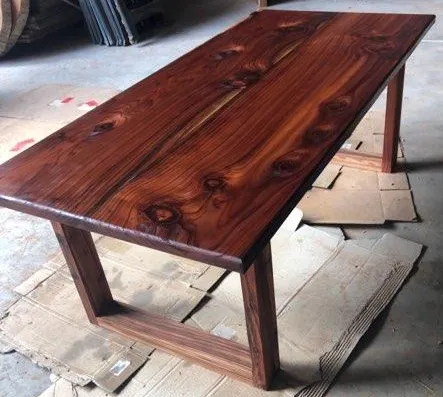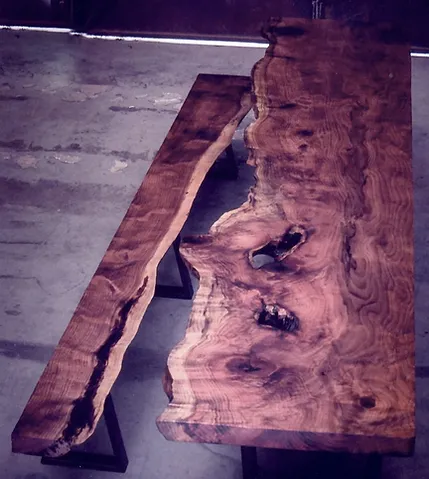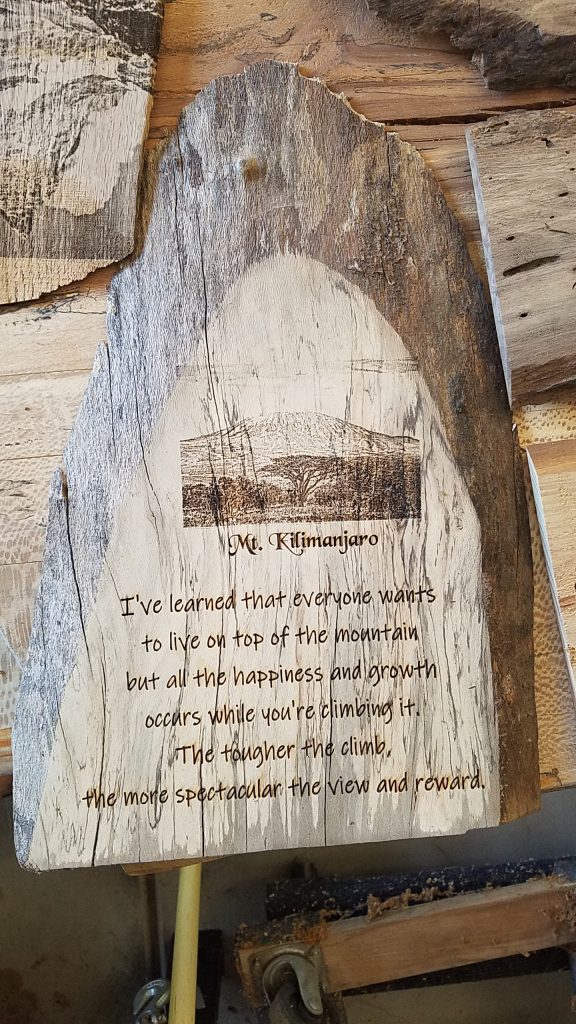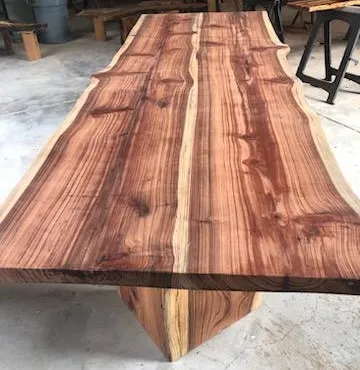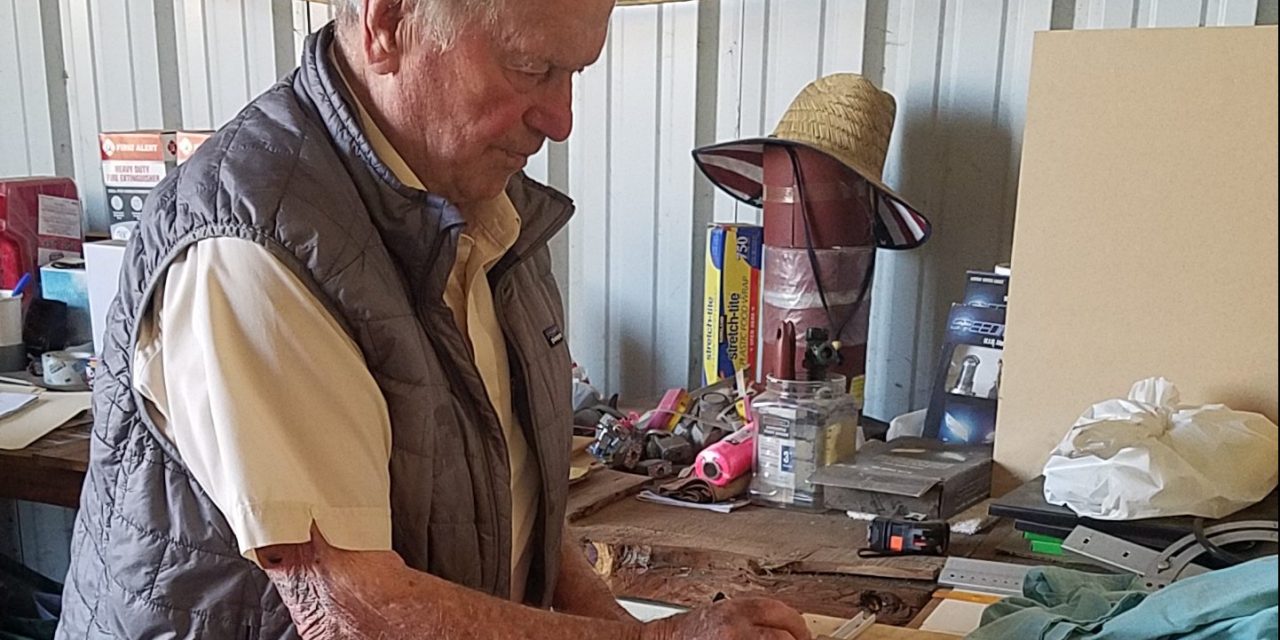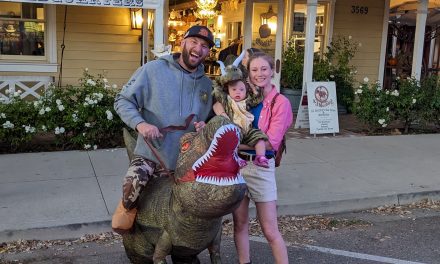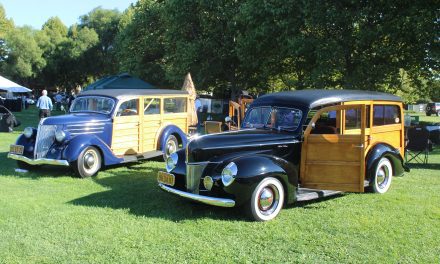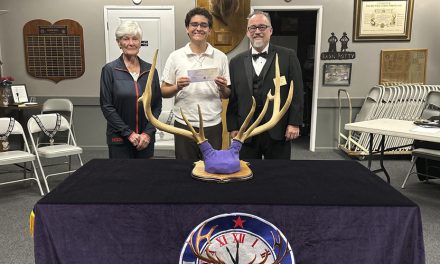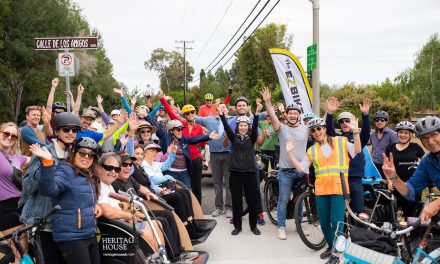Woodworking business is the latest of countless endeavors undertaken by 98-year-old Curt Jahnke
EDITOR’S NOTE: This is the expanded story on Curt Jahnke. A condensed version runs in the Santa Ynez Valley Star print edition of Oct. 20
At 98 years of age, Santa Ynez Valley resident, Curt Jahnke, doesn’t seem to be slowing down any. He is an entrepreneur, his personality fueled by his fascination and wonder of life, a focus on creativity, and the ability to never recognize limitations of any kind.
Jahnke has led a life many would dream of, but few have accomplished. From cattle ranching, farming, working in a gold mine, the medical industry, designing and building machinery, well drilling, horse racing, and building a real estate empire, not to mention climbing Mount Kilimanjaro, Jahnke is still creating. He has recently started a new business, making unique pieces of furniture and woodworking, producing small wooden plaques engraved with notable quotes, both religious and secular, many of which he has stored in his acute mind and quotes verbatim.
Woodworking is a new venture for Jahnke, but he recalls making his first major piece of furniture, a bedroom set for his bride in 1948. It wasn’t until five years ago when he located a portable sawmill in Texas that could handle logs 30 inches in diameter and 20 feet long that he and his son decided to construct a shop on five acres of land that they had purchased in Santa Ynez. They graded the land, planted trees, and poured the concrete flooring and he and his son constructed the shop together. He works there daily, making long, expertly finished tables and benches that preserve the integrity of the tree’s unique shape and structure while uniting artistic design with master craftsmanship.
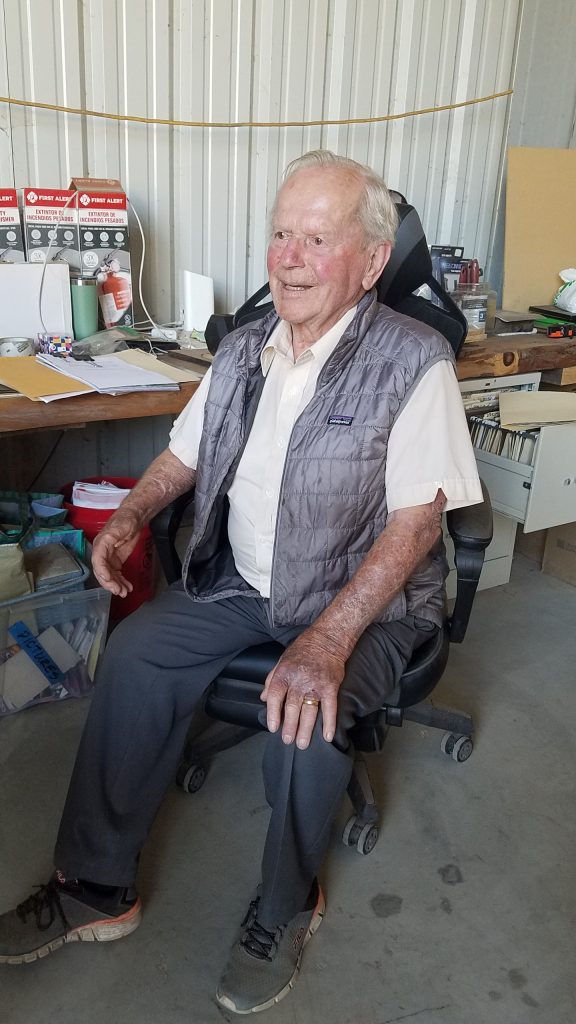
Jahnke was born on Jan. 17, 1926, in a little rural town in the Canadian province of Saskatchewan, one of the middle children of 12. He was raised on a dry ranch that raised wheat and cattle.
“One of the things that amazes me is how my father had the faith to sustain his ranch and his family during some of the bleakest times in history,” said Jahnke. “In 1929, it was the last year we had rainfall for the next 10 years, and to top it off, there was an early frost that year and all the crops were lost. Every year thereafter, he would raise the money needed to buy seed and plant a new crop. But he didn’t see rain again for another 10 years. That was also during the Depression and the Dust Bowl in the 1930s.”
Jahnke attended a one-room schoolhouse built by his grandfather who also donated the land. His grandfather was a Mennonite minister who immigrated to Canada in the 1870s. As a youngster, Curt enjoyed sports and played hockey and was known as a “feisty competitor.”
“I had always been an outdoor person and loved to track animals. As a young boy, when my mother’s brooms would wear out, I used the handle of the brooms to make darts, which were extremely accurate,” he said proudly. “We were also a family of singers so we used to entertain around our area and at church.
“I hated school with a passion and I begged my mother to let me quit. But in Canada, you had to finish the eighth grade or be 13 years old, by law, before you could quit school. My mother said, ‘Try to hang in there,’ which I did. I attended school through the eighth grade, but I was the only kid in the ninth grade, so I had to do that year by correspondence course, and in the 10th grade, I attended a new school in Herbert with 25 students, which I enjoyed.”
By 16, at the end of the 10th grade, he was drafted into the military. It was 1942.
“My father was left without anyone to help him on the farm. So, my mother and sisters had to help out,” Jahnke explained. “No one knew as much as we did about running the family farm plus there was no one to hire. All the men were at war. After two years in the military, I was deferred for ‘essential industries’ providing food for the military, so I went back to work on the family farm and returned to school and graduated at the age of 20.”
As a Mennonite of Dutch and Irish extraction, he said it was because of his background that he has been an entrepreneur all his life.
“Some of the sayings that ring a bell with me are: ‘Necessity is the mother of invention,’ ‘Being enthusiastic is being in God,’ and Calvin Coolidge’s quote ‘Nothing in this world can take the place of persistence. Talent will not; nothing is more common than unsuccessful men with talent. Genius will not; unrewarded genius is almost a proverb. Education will not; the world is full of educated derelicts. Persistence and determination alone are omnipotent. The slogan “Press On!” has solved and always will solve the problems of the human race.’
“If you live your life with good core values, you will be seen and sought after.”
Jahnke met his future wife, Tillie, at a Halloween party in 1944. In September 1946 she went off to Kansas to attend Bethel College, the oldest Mennonite college in North America, and he went to British Columbia, where he found work in a gold mine in Bralorne, a town of 500 men.
“Because I could make 25 cents more an hour working the night shift underground, I figured, why not — it was dark down there anyway,” he joked. “I worked there for a year and a half. When I left the gold mine, I went to Bethel College as well.”
At Bethel, he met Tillie again, married her in August of ’48, and continued his studies in medicine, graduating in 1950 with a pre-med degree, majoring in physics, math, fine arts, and natural sciences.
“At college, I did some bacteriological research and wrote an article for the American Medical Journal on venereal diseases,” he said. “I then extended my research on behalf of the military.
“After graduation, I had no money to continue in medical school and I asked my counselor ‘What am I good for’ and he said ‘I can’t tell you.’ So, I returned to the farm I had been working on during the summers in Idaho and grew potatoes, hay, and other crops.”
Then in 1952, Jahnke said he decided to get back in the medical field and applied for a job with Allied Laboratories as a“detail man,” traveling through the western half of Minnesota, North Dakota, and the eastern half of Montana, calling on hospitals, doctors, and clinics explaining the benefits and side effects of new medicines. The money wasn’t panning out and with a wife and one child, so he decided to make a major change in his life. He would go into the business world and become an entrepreneur.
“I joined a firm in the real estate business with five other guys and in one year I was ‘top man’ and won the Kuppenheimer Award twice — once for top salesman and once for top listing agent, which awarded me two very high-end suits,” he said, smiling. “I worked hard, took the Dale Carnegie Course and other sales courses and became a Dale Carnegie instructor, remaining with them until 1960. All the while I continued building my real estate enterprises, all of which were very rewarding.”
Jahnke, along with five partners, built five companies all related to the real estate industry. “I was really busy and loved it all,” he said. “We were really successful.”
In 1951, oil was discovered in North Dakota which created a boom town called Tioga. Following the discovery, millions of acres of land became available.
“In 1956, a real estate company in Tioga, North Dakota, went bankrupt and one of my partners and I bought everything they owned for 10 cents on the dollar,” said Jahnke. “My partner, who was older, smarter, and wealthier than I, told me to go to Tioga, and sell everything I could within the next six months. I sold all the improved properties but retained all of the lots.
“When I finished, we met up and he said ‘good job’ and we went to dinner only to discover that the town where we lived, Fargo, had been hit by a tornado damaging or destroying 1,500 homes. It was June of ’57. We drove the 300 miles home and by the time we got there we had completed our plans for the next day.”
In the disaster, Jahnke and his partner found opportunity to help rebuild the area.
“My partner said, ‘Curt, buy every piece of property that has been damaged. I will take care of the financial aspect,’ and for the next six months, all I did was buy property,” he said. “We were in a fantastic position because of the five companies we owned —construction, lumber, real estate development, a mortgage company, and an architectural firm. We were a primary supplier of housing. Here was a disaster and we had the solution for people who were part of the disaster.
“One day I got a call from a competitor, Oral Holmes, a first-class guy, who said that we ‘had done a win-win-win job which was good for the community, for ourselves, and for those in the disaster’. I am of the belief that if you can put together transactions that benefit all parties, that are win-win-win, then it’s a success.”
Jahnke sold his share of that business in 1961 and moved to Santa Barbara.
He said he played golf for a year, started a real estate company in Vandenberg Village, sold it in ’63, bought property in Santa Barbara — five acres for apartments — built 300 residential units, and he said “survived the 1969 hippie revolution.”
However, the Jahnkes wanted to explore what life was like outside of the United States.
“In April of 1967, I took my family to Switzerland for a year. In the ’60s it was the thing to do — go to Europe. Some people would go for a couple of weeks or a couple of months and see everything from Scotland to Sicily which is insane. What really would you accomplish — meeting all the tourists on the same journey? That was not our cup of tea,” he said. “We wanted to get to know the people, their work, social activity, and who they really were. But we’re not talking about just my wife and me, we were a family of five children ranging in age from 2 years to 17 years of age. We considered six months and still decided that was not doable, so I asked my wife if we could go for a year and she said yes.
“The logistics involved were just enormous: finding housing to rent, different schools for the children to attend, and transportation while we were there. It was an enormous feat. There was no internet at the time, so you can just imagine.I bought a car over the phone in Switzerland, so we would have transportation when we got there. We left in April of ’67 and returned in May of ’68. We lived in Thun. It was a challenging, exciting, and rewarding experience all at the same time. My wife and I learned to ski in the Alps, the children learned to speak German.”
Upon his return to the U.S., Jahnke took on another project.
“I built an alfalfa ranch in the desert in ’79 and dug the well in ’83, It was in an area called Water Valley, 25 miles outside of Barstow,” he continued. “I needed water. The experts said there was not enough water to supply my needs, but since I was in the well-drilling business at the time, I ended up digging a well that produced more than enough water to grow the alfalfa, which produced between five and six thousand tons of alfalfa per year.”
And that wasn’t the only thing Janke was involved in.
“As a sideline, we enjoyed racing our horses at several race tracks like Santa Anita, Hollywood [Park] and Del Mar with modest success and even one Winner’s Circle,” he recalled.
Christmas of ’89 came and instead of giving their children gifts, Curt and Tillie decided to give them experiences. Each one received a trip to Switzerland that included their wives and children. There were 17 in all, Jahnke recalled. After spending some time together in Switzerland, each of them decided to go their separate ways, visiting other countries in Europe.
“My wife and I decided to go to Africa, on safari with friends we knew from Switzerland,” said Jahnke. “It was a wonderful experience. My wife and I climbed Mount Kilimanjaro. My wife, having injured herself in a skiing accident previously, found the last part of the climb too difficult and remained in camp while I made it up to the top for the two of us.”
No sooner did they arrive back in Santa Barbara was when the Painted Cave fire destroyed their home and all their belongings. But being an entrepreneur, he started over.
“Starting over is easy for an entrepreneur,” he said. “You tackle all opportunities and starting over is not an exception.”
The Jahnkes rebuilt their home in Santa Barbara and also built a four-bedroom home on the alfalfa ranch.
“The ranch house was built out of mud bricks using a machine that was newly invented that I purchased. In one week, I made 15,000 mud bricks, enough to build a four-bedroom house. Then I sent the machine to my friend, a missionary in Uganda, so he could help the locals there to build houses for themselves,” he said.
“With the financial disaster that happened in 2006-08 combined with my wife’s illnesses, we ended up losing everything. The economic crash and medical expenses were devastating and to top it off, I needed heart surgery at 96 years of age.
“My bride, as I always called her, passed away in April 2022. We were happily married for 73½ years. She was a gem: smart, creative, intelligent, beautiful inside and out. We have five exceptional children, three boys and two girls, eight grandchildren, eight great-grandchildren and three great-great-grandchildren, all of whom we are very proud of.”
Jahnke has passed down his expertise in business to his family members
“The entrepreneurial spirit has not only been evidenced in my life but in the lives of numerous family members and also my children,” he said.
Music is also a very important part of Jahnke’s life. He has sung in the productions of Messiah all over the country for 25 years. He was also a member of a choral society that traveled all over the United States and has been a member of the Society for the Preservation and Encouragement of Barber Shop Quartet Singers in America (SPEBSQSA) for his entire life.
“I am incredibly grateful to have shared my life with such a wonderful woman, wife, and mother and for all of our beautiful children and for this life I continue to live. I consider myself truly blessed,” he said humbly.
Nothing seems to hinder Jahnke from bouncing back, not a clogged heart valve, the death of his beloved spouse, or the loss of his life’s work. He persists, regardless, doing what he loves; inspiring people with the quotes he lasers onto wood or creating impressive furniture for people in our community to enjoy. And he does it with a joyful heart and a smile etched on his youthful face.
For more information on his woodworking, visit theemill.com, or call or text (805) 280-1900.
